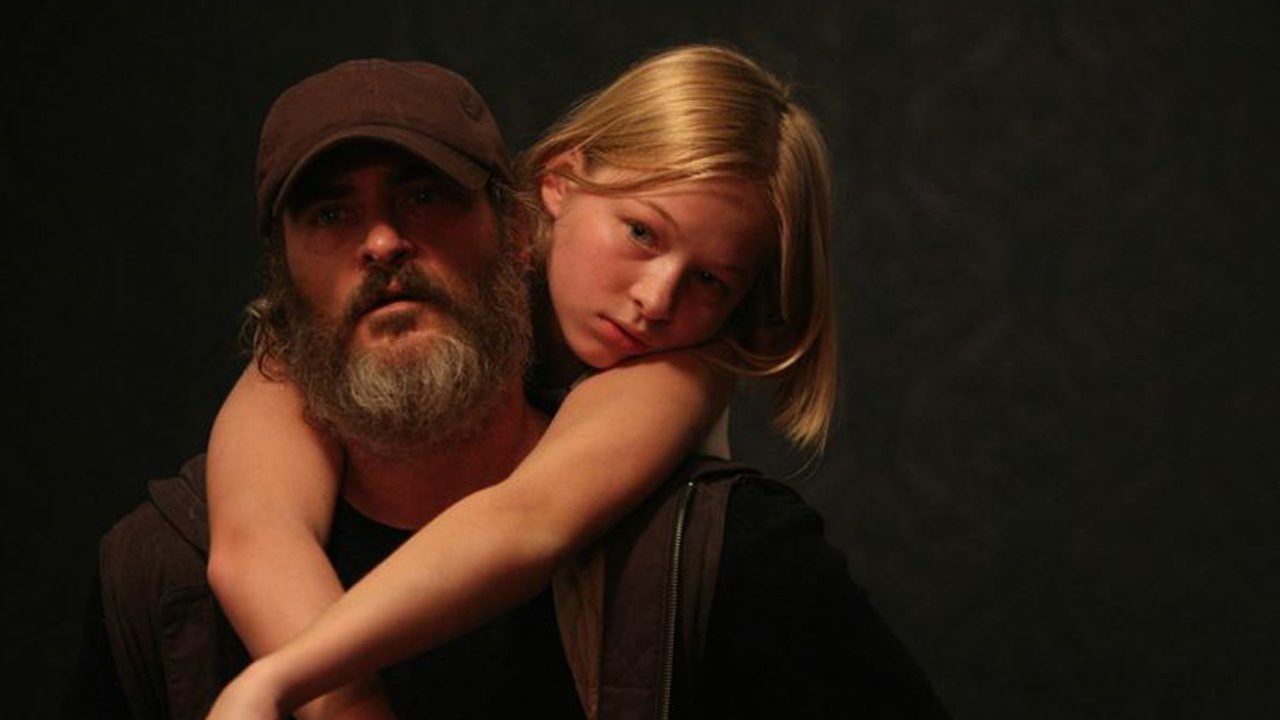Lynne Ramsay is in the driver’s seat of ass-kicking arthouse films, injecting another strain of sadism into the genre that shows the depravity of human capabilities and the redemption in spite of it.
The life of the contract killer requires control in the midst of chaos, as having full control over any situation is what keeps you alive. Now, throw in the unaccounted variable of companionship, and this contingency becomes a vulnerability and jeopardizing to one’s life. This is the synopsis of the new movie You Were Never Really Here.
You Were Never Really Here is the story of a buy-for-hire killer, Joe (Joaquin Phoenix), who lives a life of dark solace in modern day New York City. A burly bear of a man, Joe is silent and consumed in his own thoughts, blending into the background of normal daylight hours before operating in the shadows of his nighttime life as a monastic mercenary. And how easy it would be to live this lifestyle, except Joe must care for his aging mother (Judith Roberts), whose home he returns to between jobs to tend to her in her declining mental state. One day, a new job pops up – to locate the daughter of a high-profile Senator (Alex Manette) – except finding the girl, Nina (Ekaterina Samsonov), doesn’t mean the end of the job. Joe soon finds that he’s waded into a criminal underworld of child sex trafficking coordinated at the highest levels. When the job goes south, Joe must decide whether to live a lone wolf life or to fight for her safety, which threatens everyone’s survival, in his most compromised, uncontrolled state.
The pairing of the film’s director, Lynne Ramsay, and Joaquin Phoenix, artists who don’t so much as turn a blind eye to the heinous and horrific parts of the human psyche as much as they full-tilt bulldoze towards it, makes for an electrifying experience. As the grizzly-bearded and barrel-chested Joe, Phoenix delivers another stunning performance in a role that requires him to push to the fringes of human behavior. Playing a muscly heat-seeking missile during the film’s action scenes, Phoenix also delivers in the moments of mental anguish in which Joe stows away in the closet of his childhood home and wraps a plastic bag over his head to re-live moments of childhood trauma to queasy effect.
The pairing of the film’s director, Lynne Ramsay, and Joaquin Phoenix, artists who don’t so much as turn a blind eye to the heinous and horrific parts of the human psyche as much as they full-tilt bulldoze towards it, makes for an electrifying experience.
The theme of control is something that Ramsay has become acclaimed for mastering in her movies. She pushes audiences past the limits of their comfort zone to show the depths of wickedness that humans are capable of, as 2011’s We Need to Talk About Kevin revealed the amount of sin that people commit that borders on the demonic. In You Were Never Really Here, while Ramsay again displays the depravity of human behavior, she seems more intent on exploring how people get to become broken, how innocence can become lost at the earliest of ages. When Joe sees Nina experience horrors first-hand, he realizes that the circle of abuse he endured as a child continues against all of his efforts and forces him to question: did he really save her? Was he ever really there?
While You Were Never Really Here doesn’t set out to capture the poetry of We Need to Talk About Kevin, the film is still a crackling action thriller with stunning cinematography that shows artistic flourish. Ramsay and Phoenix craft a morality drama that shows how good efforts in a broken world can come up fruitless. Ramsay wades into these waters to capture this dark, depraved part of the very real human psyche while capturing this in an artfully electrifying fashion is a trip that cinephiles will love to take.
85 minutes. ‘You Were Never Really Here’ is rated R for strong violence, disturbing and grisly images, language, and brief nudity. In theaters April 6.
Ryan Rojas
Ryan is the editorial manager of Cinemacy, which he co-runs with his older sister, Morgan. Ryan is a member of the Hollywood Critics Association. Ryan's favorite films include 2001: A Space Odyssey, The Social Network, and The Master.

